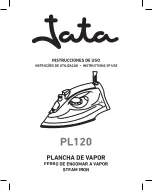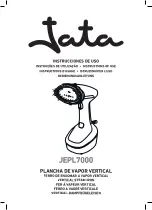
2
TEMPERATURE CONTROL SETTING
•
Always check the garment label for ironing instructions before
ironing the garment. If the label is missing then the table (right) may
help you.
•
First sort out the laundry; wool with wool, cotton with cotton etc. Start
ironing the fabrics requiring the lowest temperature setting and
progress to the higher temperature settings because the iron heats
up quicker than it cools down.
•
If the fabric consists of various kinds of fibres (e.g. cotton with
polyester) you must always select the ironing temperature for the
material with the lowest advised temperature.
OPERATING THE IRON
•
Insert the plug in the power socket and stand the iron upright.
•
Turn the temperature control dial (A) to the desired temperature
setting.
•
When the desired temperature has been reached the pilot light (C)
will go out. The pilot light will turn on and off from time to time,
indicating that the selected temperature is being maintained.
•
When ironing is finished disconnect from the mains.
CARE AND CLEANING
•
Allow the iron to cool completely before cleaning.
•
The casing can be wiped with a damp cloth and polished with a dry cloth.
•
Never use abrasives to clean the soleplate.
•
Keep the soleplate smooth, avoid contact with metal objects.
STORAGE
•
Turn the temperature control dial (A) to the minimum position.
•
Disconnect from the plug from the power socket.
•
Stand the iron in the upright position and let it cool down completely.
•
Always store the iron in an upright position.
SAFETY PROTECTIVE CUT-OUT
In the unlikely event of the thermostat failing, the protection cut-out will operate to prevent the iron overheating.
ENVIRONMENT
Do not dispose of electrical appliances as unsorted municipal waste, use separate collection
facilities. Contact your local government for information regarding the collection systems
available. If electrical appliances are disposed of in landfill or dumps, hazardous substances can
leak into the groundwater and get into the food chain, damaging your health and well-being.





















